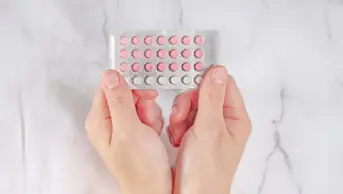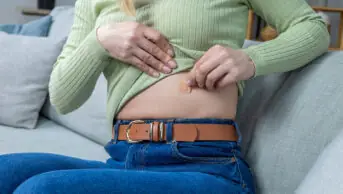
Shutterstock.com
The National Institute for Health and Care Excellence (NICE) has recommended “menopause-specific cognitive behavioural therapy (CBT)” for the management of vasomotor symptoms — such as hot flushes and night sweats — and sleeping problems associated with menopause.
In updated guidance published on 7 November 2024, NICE recommended menopause-specific CBT as a management option for menopause in people aged 40 years and over in addition to hormone replacement therapy (HRT), or as an alternative for those who prefer not to take HRT or if it is contraindicated.
The recommendation follows evidence that showed CBT led to improved sleep, as well as beneficial outcomes in frequency and severity of vasomotor symptoms, with the greatest effect seen in the reduction of “distress or bother” associated with the symptoms.
In the guidance, the NICE committee noted challenges associated with access to CBT, including long waiting times and additional training that may be required for providers.
However, it added that “online and group CBT” may be an “easier and less costly” option, alongside existing resources that could be adapted to train people to provide menopause-specific CBT.
In addition to CBT, the guidance also emphasised the importance of a personalised, tailored approach when considering the options for managing menopause-related symptoms; the impact of increased dosage of estrogen and progestogen on the risk of endometrial cancer; and outlined different treatment options for genitourinary symptoms of menopause, including women with a history of breast cancer.
Commenting on the updated guidance, Aimee Spector, professor of clinical psychology of ageing at University College London, said: “Whilst CBT was recommended in the previous guidelines for psychological symptoms (anxiety and depression), the key change is that it is now a suggested treatment for vasomotor symptoms (hot flushes and night sweats) and sleep.
“I am aware that many felt, when the new draft guidelines were written, that this change might risk undermining the impact of hormonal changes and imply that symptoms were purely ‘in the head’.”
“I am pleased that the guidelines clarify that CBT might be a useful addition to HRT, or an alternative for the many people unable to take it,” she added.
“A significant challenge, highlighted by NICE, will be implementation. NHS waiting times for CBT in people with anxiety and depression tend to be huge and this will create significant new demand,” said Spector.
Jonathan Benger, chief medical officer and interim director of the centre for guidelines at NICE, said: “Recognition of the impact that menopause symptoms can have has grown in recent years, but we know that there remains more to be done to improve the consistency and quality of support. Not least for women from minority ethnic backgrounds or from a poorer area, who are often unaware of or unable to access treatments that could help them.
“[This guidance] stresses the importance of promoting equitable access to effective care by considering factors, such as ethnicity and recognising the diverse needs of different community groups.”
“Women need to feel confident that they will be offered advice and options that meet their needs, and that they will be supported to make the choices that are right for them,” said Benger.
In a statement published on 7 November 2024 in response to the guidance, the British Menopause Society said that the guideline “marks an important development in the diagnosis and treatment of menopausal women”, recognising its focus on treatment options and individualised care for menopause.
However, it also noted limitations in the guidance, such as excluding a review of evidence “on the impact of early menopause on bone, cardiovascular and cognitive health in women with early menopause”.
Demand for HRT has risen significantly in the past three years. According to data published by the NHS Business Services Authority on 17 October 2024, the number of HRT items dispensed in England rose by 22% in 2023/2024 to 13 million items. An increase of 47% was recorded the previous year, from 7.4 million items in 2021/2022 to 10.9 million in 2022/2023.
The latest figures for 2023/2024 also show a continued increase in the number of patients prescribed HRT, from 2.3 million in 2022/2023 to 2.6 million in 2023/2024.


